As the death toll in Gaza tops 10,000, the Biden administration faces growing pressure at home and abroad to compel Israel to take steps to minimise civilian deaths in its drive to oust Hamas. US officials are publicly and privately stressing the need to protect human lives in the Gaza Strip, where the Hamas group rules over 2.3 million Palestinians, including pushing for a pause in fighting to get food in and residents to relocate.
Critics say the US efforts are falling short after a month of Israeli bombardments on civilians. On Monday, the leaders of several major United Nations bodies united behind a call for a humanitarian ceasefire in Gaza, where health authorities said the death toll topped 10,000.
A sizable majority of Americans would like to see the US negotiate to get Gaza citizens out of harm's way, Reuters/Ipsos polling shows.
Independent US Senator Bernie Sanders said on Sunday that Israel had every right to defend itself against Hamas. "But what Israel does not, in my view, have a right to do is to kill thousands and thousands of innocent men, women and children who had nothing to do with that attack," Sanders told CNN's "State of the Union" program.
Sanders, a Democratic presidential hopeful in years past, echoed the sentiments of many of President Joe Biden's fellow Democrats, human rights groups and European and Middle East governments pushing for restraint.
Given the US gives Israel $3.8 billion a year in military aid, Sanders said, "We have a right to say, 'Sorry, you need a new military strategy."
US officials have rebuffed putting any conditions on aid, but several have voiced frustration with their inability to persuade Israel to show more restraint in its attacks on Gaza.
The Oct. 7 attack on Israel, in which Israel says Hamas gunmen killed 1,400 people, mostly civilians, and took more than 240 hostages to Gaza, dealt a psychological blow, exposed security vulnerabilities and dispelled an aura of invincibility.
US officials who specialise in the conduct of military campaigns are advising Israel on how to minimise civilian casualties while Washington pushes Israel to avoid some targets in Gaza, said a senior State Department official who traveled with Secretary of State Antony Blinken to the region.
Blinken completed his second Middle East tour to the region since Oct. 7 but with no apparent progress on persuading Israel to accept the humanitarian pause Washington is seeking.
Multiple US officials say they have been able to influence its conduct in the war somewhat. But any reduction in the number of strikes in recent days has been "swallowed up" by images of strikes that hit civilians, one official said.
Israel wants to "squeeze" Hamas and sees any concessions to humanitarian access as easing pressure on the group, but has moved from an initial position where "three (aid) trucks was too much," said a senior State Department official.
A US official said on Monday there were fewer than 30 aid trucks over the last 24 hours which brought the total number to 476. In Baghdad on Sunday, Blinken said the number of aid trucks was "grossly insufficient."
The $3.8 billion in aid cited by Sanders is a 10-year, $38 billion military assistance package signed under former President Barack Obama. At the time it was the most military aid the US had given any country.
Biden has asked Congress for another $14 billion in aid for Israel since the Hamas attacks.
Asked in London last week whether the US should condition aid to Israel on prioritising reducing harm to civilians, Vice President Kamala Harris said, "We are not going to create any conditions on the support that we are giving Israel to defend itself."
The United States has attached conditions to military aid and deals with other countries, including requiring Ukraine to agree not to hit targets inside Russia with long-range rocket systems last May, and selling Saudi Arabia only defensive arms.
Putting conditions on aid to Israel is unlikely, and would be opposed by Republicans and many Democrats in Congress, said Aaron David Miller, a Middle East analyst and former State Department official.
Israel and the Biden administration have repeatedly rejected growing calls for a ceasefire on grounds it would allow Hamas to regroup. The administration favors a "humanitarian pause," which it views as something less than a ceasefire, but Israel stands opposed.
"There is limited leverage the US has on shaping the contours of the operation," said Raphael Cohen, a political analyst with Rand Corporation, beyond trying to get Americans out and humanitarian aid in.
The Israeli government mindset right now appears to be that the world is turning against it but that that is the cost of rooting Hamas out of Gaza. "If that is your framework, there is a limit to how much international pressure is going to matter," Cohen said.
US lawmakers who back a ceasefire support Israel eradicating Hamas, but some say Israel's strategy will backfire.
"When you kill thousands and thousands of Palestinians, and thousands of children, and you bomb refugee camps, even if you are taking out some Hamas leaders ... if you keep doing that, you will radicalise the population and another Hamas will arise," said US Representative Pramila Jayapal, leader of Democrats' progressive caucus.
Former President Barack Obama raised the idea of US culpability in an interview released over the weekend. "What Hamas did was horrific and there's no justification for it. And what is also true is that the occupation and what's happening to Palestinians is unbearable," he said. "You have to admit," Obama said, "that nobody's hands are clean, that all of us are complicit to some degree."

A wounded Palestinian man carries children following a strike in Rafah on the southern Gaza Strip on Monday. AFP
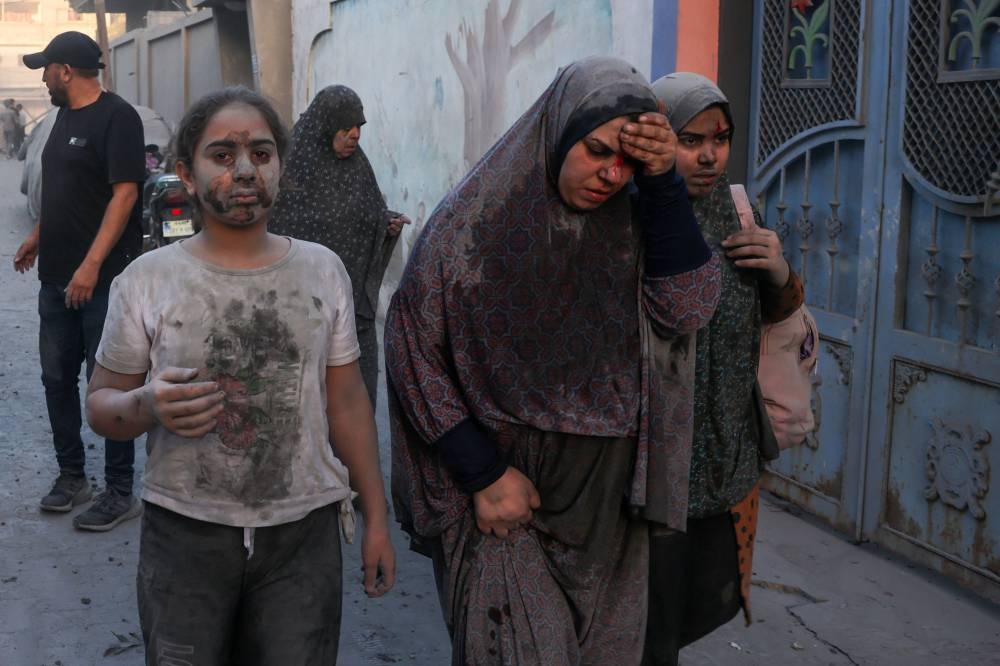
Wounded Palestinians walk near the site of a strike in Rafah on the southern Gaza Strip on Monday. AFP

Demonstrators rally outside the White House in support of Palestinians in Gaza, in Washington, Saturday. REUTERS

A Palestinian family sits near destroyed houses following a strike in Rafah on the southern Gaza Strip on Monday. AFP
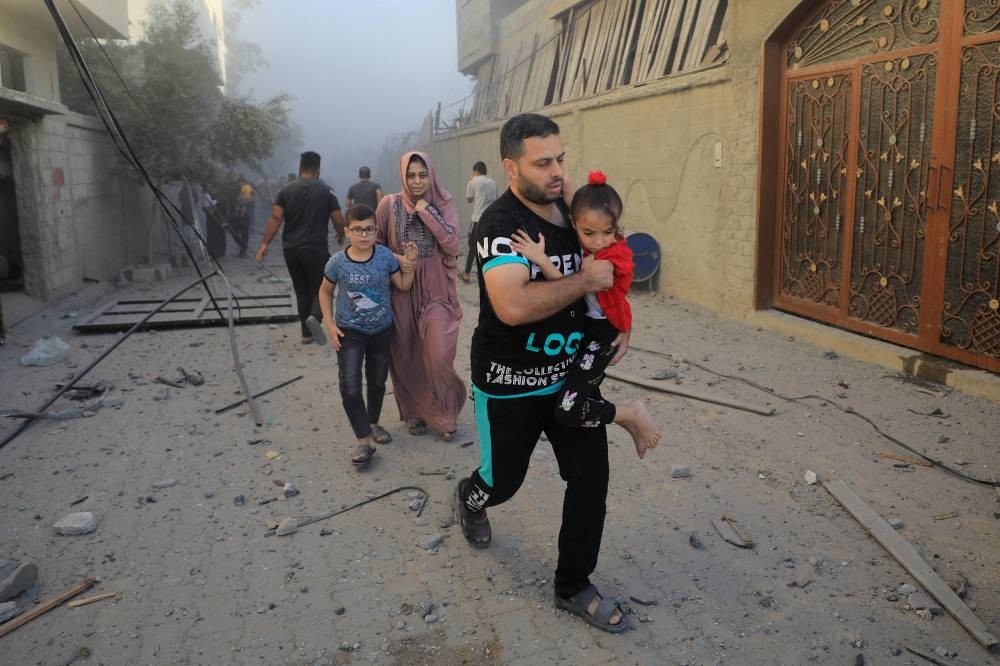
Palestinians evacuate the site of Israeli strikes on houses in Maghazi refugee camp in the central Gaza Strip, Monday. REUTERS

Pro-Palestinian demonstrators show their hands painted in red as they shout slogans during a protest against US Secretary of State Antony Blinken's visit to Turkiye, near the Turkish Foreign Ministry in Ankara Turkey Monday. REUTERS
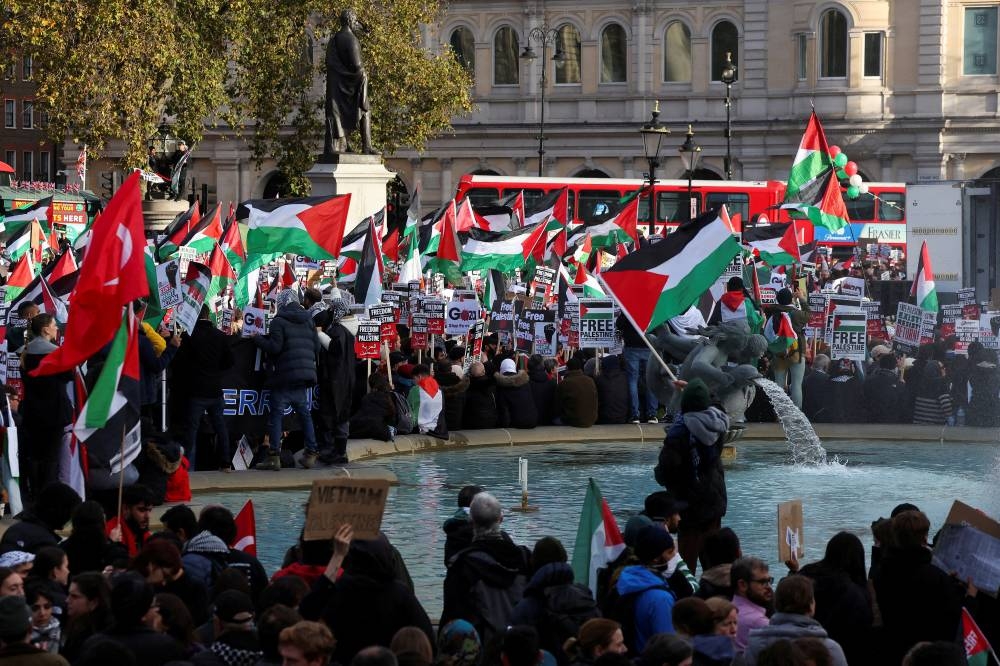
Demonstrators gather at Trafalgar Square as they protest in solidarity with Palestinians in Gaza, in London, Saturday. REUTERS
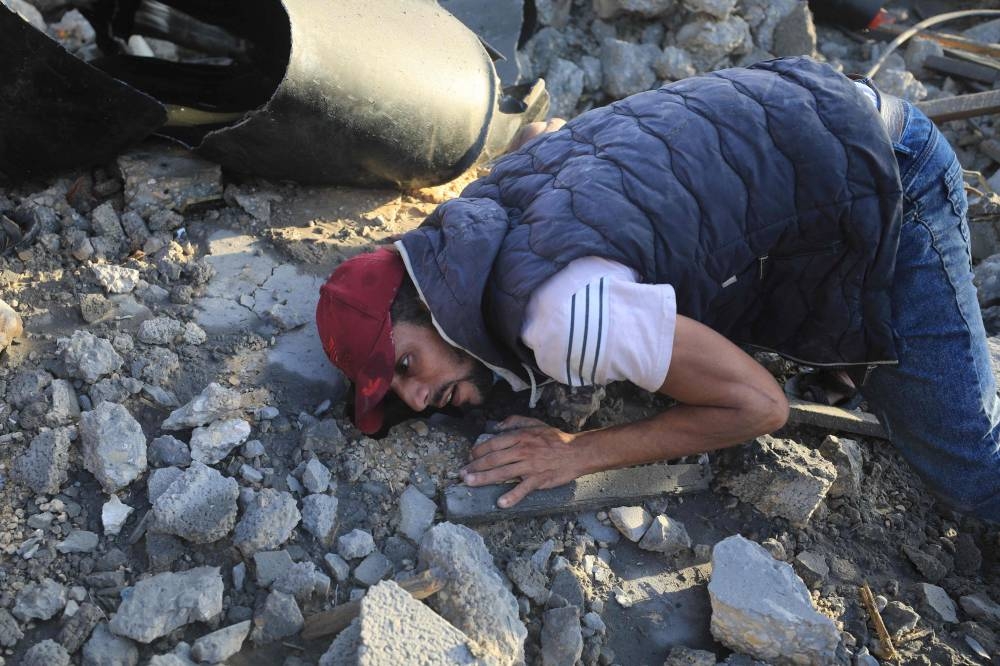
A man places his ears above debris of a destroyed building following Israeli air strikes on a neighbourhood in the al-Maghazi refugee camp in the central Gaza Strip on Monday. AFP

A wounded Palestinian youth looks on near the site of a strike in Rafah on the southern Gaza Strip on Monday. AFP
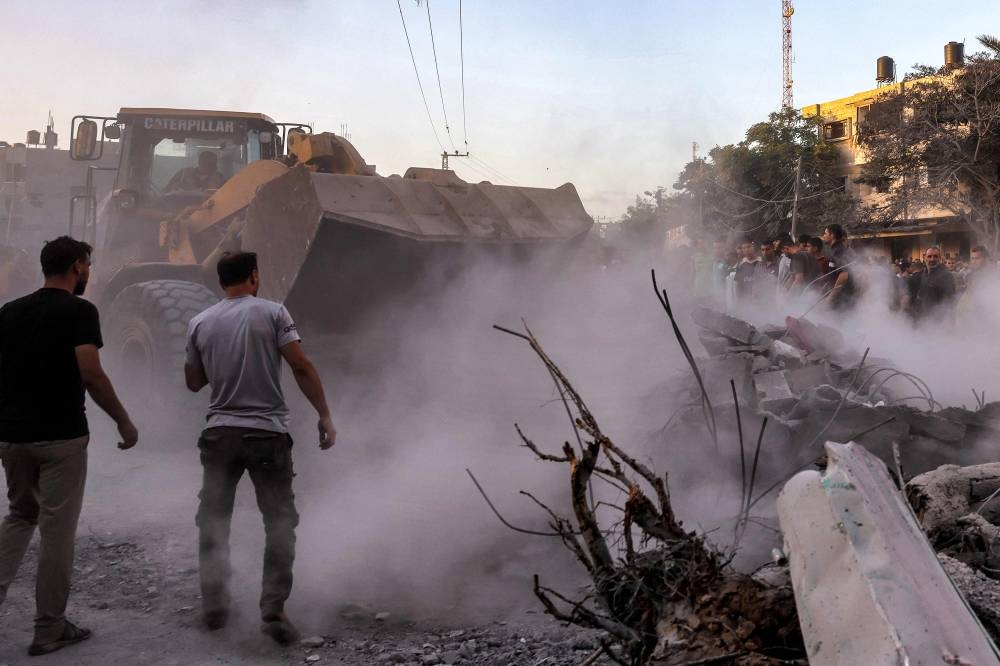
An excavator clears rubble as people search for survivors and the bodies of victims in the aftermath of Israeli bombardment in Rafah in the southern Gaza Strip on Monday. AFP
